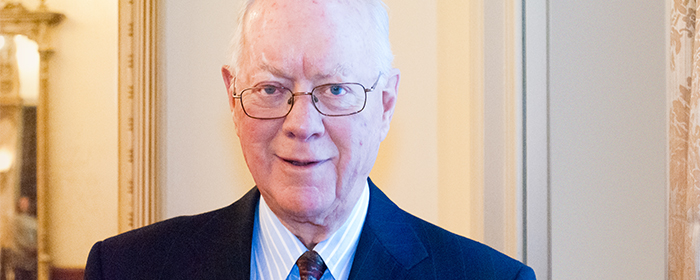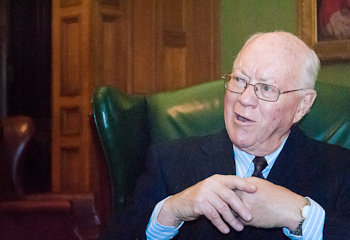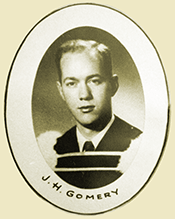
The Honorable John H. Gomery (BCL’56) chats with Focus Online about his rocky start as a student at the Faculty of Law, his memories of F.R. Scott, and the question of corruption in politics.
In households across Canada, the name John Gomery (BCL’56) is synonymous with taking a stand against governmental corruption. But the former Superior Court of Quebec judge and famously outspoken public inquiry commissioner is also a distinguished alumnus of the Law Faculty. And on February 11, he delivered the University’s annual F.R. Scott lecture, presented by the McGill Friends of the Library in partnership with Heenan Blaikie, entitled: “Corruption: A View from an Insider.”
In an entertaining conversation with Bernard St. Laurent, a senior commentator on Quebec politics for CBC Radio, Gomery expressed his views of corruption in politics, particularly the unlawful conduct and mismanagement in government that has been exposed by commissions of inquiry such as the one he headed in 2004 and 2005, and the ongoing Charbonneau Commission.
Ann Vroom, President of the McGill Society of Montreal and the McGill Alumni Association, introduced the two speakers, while Me Sylvain Lussier, lead counsel for the federal government at the Gomery Inquiry and, more recently, the former lead prosecutor at the Charbonneau Inquiry, gave the concluding remarks.
The event drew more than 175 guests to the Faculty Club, as well as reporters from CTV, CBC and other local media, including Focus Online, with whom the Honorable John H. Gomery sat down for an exclusive interview.
|
You’re giving the F.R. Scott lecture tonight, and you actually studied under him when you were at McGill Law in the 1950s. Any fond memories of that time?
I have vivid recollections of my years at the Faculty. It was at Chancellor Day Hall, but the moot court and the library didn’t exist back then. It was a much smaller faculty: there were about 110 students in first year law, which they cut down to about 40—it was easy to get into law school, but it wasn’t easy to stay in. Those who survived the cut stayed together all the way to the end. I made some good friends there, who are still my friends today.
We had a great Faculty. The professor that I liked and admired the most was clearly Frank Scott, who taught us constitutional law. Everybody revered him because he was such a good teacher, he was so interesting, and he had been there a long time. When one of the other professors was sick or absent for any reason, he would be the replacement and we loved it when he would teach us something other than constitutional law.
The curriculum has changed a lot since then, but I think some things remain the same. Fundamentally, learning the law means a lot of memory work. Something happens to you, sort of like Saint Paul on the road to Damascus, in first-year law. You’ve got to start to think like a lawyer: To reason, to be dispassionate and objective, and to develop your analytical faculties. And that’s a big adjustment.
I had a tough time in first year. I nearly flunked out. I was warned—they told us on the first day that a lot of people would either drop out or fail, and that we should be diligent, attend classes, read the cases—but I just did what I’d always done before, in high school and in my Arts degree, which was to have a good time, and not to spend too much time worrying about my courses until about two weeks before the exams. So, I made a lot of new friends, and the first couple of months passed by.
But then they had something that I don’t think they have now, a little oral exam the week before Xmas, where two or three members of the Faculty would briefly interview each student. The ones who were clearly ‘not with the program’ would then get a letter from the Dean, who was C.J. Meredith at the time, saying, ‘Drop out now, and we’ll refund you your second-term fees, because it’s clear that you’re not going to make it.’
And I got one of those letters.
I’ve never been so upset in my life. It scared the life out of me. I didn’t tell my parents. I agonized for about 48 hours and then I said, ‘No, I’m going to give it the old college try.’ I started working very hard. I closed the library every night. And I squeaked through my first exams with a 51. I found out later that I was the only one to get that letter and turn things around. I ended up… not at the top of the class, but a very respectable tenth or so, which was very good for me, and fourth in the bar exams. I’ve always felt that I owe my career to that letter, and to the library. I acquired the habit of studying, and found out that I really liked what I was studying. I had fallen in love with the law.
What are the main points you will be making in your talk this evening?
First of all, that I’m an ardent supporter of commissions of inquiry—they are a very valuable institution. The hesitation of the former government of Quebec to appoint the Charbonneau Commission was mystifying. It seems like an admission that they didn’t want something to come out—and it’s going to come out now anyway. It was the same thing with the Gomery Commission: there was an attempt to cover something up, it didn’t work, and the cover-up was worse than the scandal. Cover-ups never work. The truth will out—if there’s a commission of inquiry, of course.

Another thing that I’m going to be professorial about is the confusion in the public’s mind between what is called ‘proof’ and the allegations made at a commission of inquiry. In the law, whether it’s the Canada Evidence Act or the Civil Code, sworn testimony is ‘de la preuve,’ it’s evidence. It makes me choke on my coffee when I read that a politician has said: ‘it’s true that this investigation has made certain allegations, but there is no proof, and I maintain my innocence.’ Someone is innocent until proven guilty, but when a witness goes in front of a commission of inquiry, swears to tell the truth and is interrogated, then that is no longer an unsupported allegation: he’s put his oath behind what he’s saying. So if it’s a lie, he’s subject to perjury. It isproof. It may not be retained, but there’s proof, and it has to be evaluated.
One of the problems is linguistic: In English, the section of the Civil code on this is called Evidence, and we have the Canada Evidence Act. But the French word is ‘de la preuve.’ So, because we live in a franglais atmosphere, people might think that ‘de la preuve’ is proof. But evidence and proof are not the same thing.
One more theme of my talk will be the democratic nature of an inquiry. A public inquiry gives citizens a chance to participate in an issue of great importance. Even if they are just watching it on television, they get involved to some extent, because they are thinking about these issues. And that’s tremendously important, because citizens don’t participate very much in municipal matters—which, frankly, affect them more than federal or even provincial politics. If citizens get indignant, then they’re be more likely to get involved—to vote, to present themselves as candidates, or to make a donation to the party that they think is honest.
Interview by Bridget Wayland.
Photos by Lysanne Larose.

 John Gomery graduated from McGill University with a BA in 1953 and a BCL in 1956.
John Gomery graduated from McGill University with a BA in 1953 and a BCL in 1956.